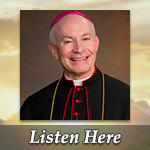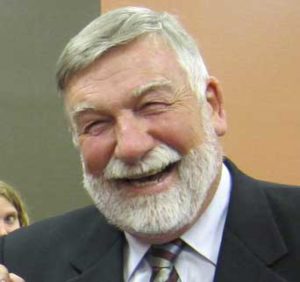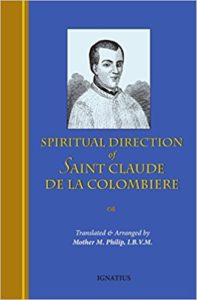Podcast: Play in new window | Download (Duration: 37:19 — 25.7MB) | Embed
Subscribe: Apple Podcasts | Spotify | Amazon Music | Android | Pandora | iHeartRadio | JioSaavn | Podchaser | Gaana | Podcast Index | Email | TuneIn | Deezer | Anghami | RSS | More

Episode 40 – Journey of Faith – Why it Matters: An Exploration of Faith with Archbishop George Lucas
Archbishop Lucas and Kris McGregor discuss the “Journey of Faith”, a new way to bring together parishes within the Archdiocese, helping to meet the challenges and new reality facing parish life. While the conversation primarily addresses what is happening within the Archdiocese of Omaha, Archbishop Lucas’ words can be of great benefit to other Dioceses across the country facing similar challenges as well.
From the Archdiocese of Omaha’s Website:
Current Realities, priesthood
“The challenge is to see this as an opportunity, to have a deeper experience in the activity of the Holy Spirit, and to respond really in faith, and to trust God.” – Archbishop George Lucas
Families of Parishes: A Modern-Day Answer in Our Journey of Faith
Why does this Journey of Faith matter so much right now? Think about how you have experienced or struggled in your own journey of faith. As one church, we must respond to changes in our Catholic community and the world around us.
A Vision for Active Parish Communities
Our shared vision for the archdiocese guides our Journey of Faith over the next three years. It comes directly from the hopes and spiritual desires of Catholics shared in listening sessions across the archdiocese.
Where We’ve Been
What we’ve learned over the last few years, will help us understand how to embark on a new journey to live our Catholic faith in new, more outgoing ways.
Journey of Faith Prayer
Lord and Giver of Life,
we ask for your guidance
as we journey to discover your plan
for our parishes and schools.
Change can bring about great excitement;
it can also be the source of anxiety and fear.
Help us to move forward with faith, courage and confidence.
Give us open minds and clarity
as we discern your will for a promising future.
May Jesus, the constant companion of the Church since Pentecost,
help us to accept the challenges of loving service
in new and invigorating ways.
May Mary, Mother of the Church,
encourage our efforts to listen and learn.
In the beginning, you hovered over the waters,
giving birth to your plan for creation.
You were present to the People of Israel,
speaking to them, teaching them,
and guiding them. Be present with us now,
and give us your light to see the way.
Amen.
For more episodes in this series, visit the


 What a joy to discuss the 2nd edition of “The Spiritual Direction of St. Claude de la Colombiere” with John Galten, who wrote the forward to the book. Filled with an abundance of wisdom this little work is a must for those seeking solid spiritual guidance. In this podcast, we discuss the great legacy of St. Claude as well as the historical and spiritual richness of the devotion to the Sacred Heart of Jesus. John is a delight to talk with him, his joy for Christ and deep respect for St. Claude is utterly engaging.
What a joy to discuss the 2nd edition of “The Spiritual Direction of St. Claude de la Colombiere” with John Galten, who wrote the forward to the book. Filled with an abundance of wisdom this little work is a must for those seeking solid spiritual guidance. In this podcast, we discuss the great legacy of St. Claude as well as the historical and spiritual richness of the devotion to the Sacred Heart of Jesus. John is a delight to talk with him, his joy for Christ and deep respect for St. Claude is utterly engaging.
